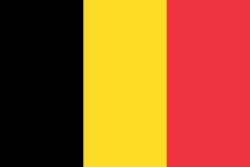| Belgium at the 1936 Winter Olympics | |
|---|---|
 | |
| IOC code | BEL |
| NOC | Belgian Olympic Committee |
| in Garmisch-Partenkirchen | |
| Competitors | 27 (24 men, 3 women) in 5 sports |
| Flag bearer | Eric Vicomte de Spoelberch [1] |
| Medals |
|
| Winter Olympics appearances (overview) | |
Belgium competed at the 1936 Winter Olympics in Garmisch-Partenkirchen, Germany.